Build your customer referral program without the dev time
Sign up for a free trial of GrowSurf to lower your customer acquisition costs, increase customer loyalty, and save gobs of time.
Launch Your ProgramIt's human nature to like what other people like. This psychological phenomenon is known as social proof, where people copy the actions and behaviors of others in an attempt to reflect correct conduct. It doesn't matter if you live in Japan or Mexico; we're all looking for social acceptance and tend to conform to societal norms and expectations.
For example, the widespread popularity of kale and other health food trends can be attributed to social proof, as people tend to mimic the dietary choices of their peers and influencers. Or else, how would you explain the sudden kale craze that swept across the nation?
That desire to fit in and conform to social norms can affect all aspects of our life – from food choices and fashion trends to the movies and TV shows we watch. For instance, the popularity of certain Netflix series often spreads through word-of-mouth recommendations and social media buzz, exemplifying the power of social proof in shaping our entertainment preferences.
But that desire to fit in and conform to social norms also has a profound impact on our purchasing behavior. We often rely on the opinions, reviews, and recommendations of others when making buying decisions, especially for products or services that are unfamiliar or involve a higher perceived risk.
In short, this means that if a friend or someone we trust recommends a product, we're far more likely to end up purchasing that product than if we solely relied on the product's description or marketing materials. The power of social proof lies in the implicit trust we place in the opinions and experiences of others, especially those in our immediate social circles.
Businesses are keenly aware of the science behind social proof, and they have been leveraging it to their advantage for years through various marketing strategies and tactics. From displaying customer testimonials and reviews to partnering with influencers and showcasing social media engagement metrics, companies actively seek to capitalize on the power of social proof to build trust, credibility, and ultimately drive sales.
In the following sections, we'll delve deeper into the concept of social proof, exploring its underlying psychological principles and examining real-world examples from various industries. We'll also provide actionable strategies and best practices for leveraging social proof effectively in your own business, helping you increase conversions, build brand credibility, and foster a loyal customer base.
The term 'social proof' was coined by psychologist Robert Cialdini in his influential book Influence: Science and Practice, where he identified it as one of the 6 principles of persuasion. Cialdini's work has been widely recognized and cited in the field of psychology and marketing, lending credibility to the concept of social proof.
In a nutshell, social proof is a persuasion technique that taps into the fundamental human desire to be part of a larger group or community. The main idea behind social proof revolves around our innate need for social inclusion and conformity – the feeling that we're behaving in a way that is expected, accepted, or desired by others. By observing the actions and choices of those around us, we seek to align our own behavior with societal norms and perceived wisdom.
For example, if a particular book series like Harry Potter becomes a global phenomenon with millions of readers, the wisdom of the crowd dictates that you are likely to be influenced by its widespread popularity and social acceptance, increasing the likelihood that you'll read and enjoy the books as well. This exemplifies how social proof can shape our preferences and behaviors, even in areas as personal as reading choices.
In the realm of marketing, social proof is particularly influential when it comes to consumer purchasing decisions. It manifests itself through various forms, such as reading product reviews, seeking recommendations from friends and family, or observing the popularity and social media buzz surrounding a particular brand or product. By leveraging social proof effectively, businesses can tap into the power of collective wisdom and build trust with potential customers, ultimately driving sales and customer loyalty.
If a large number of people have used a service ("More than 500,000 people trust our services") or purchased a product ("Over 50,000 products sold"), it creates a powerful social proof effect, where potential customers are more likely to follow the actions of others and become customers themselves. This is because the perceived wisdom of the crowd lends credibility and trust to the product or service, reducing perceived risk and increasing the likelihood of a purchase decision.
Savvy businesses leverage social proof as a powerful marketing tool to demonstrate to potential customers that their products or services have been tried, tested, and endorsed by a significant number of existing customers. This social validation helps mitigate perceived risks and uncertainties, as it implies that the offering has already been vetted and approved by a larger community. Consequently, potential customers are more likely to feel confident in their purchasing decisions, as opposed to buying from a relatively unknown or unproven source without any social proof or reviews to rely on.
To underscore the significance and impact of social proof, let's examine some compelling statistics that highlight its persuasive power in influencing consumer behavior. These insights will provide a quantitative foundation before we delve into real-life examples of how businesses effectively leverage social proof in their marketing strategies.
While the concept of social proof is rooted in psychology, its application in marketing and business is not a new phenomenon. Savvy companies have been leveraging the power of social proof for years, and the results have consistently demonstrated its effectiveness in driving consumer behavior and business growth. However, as the digital landscape continues to evolve, it's crucial for businesses to stay attuned to the latest trends and best practices in leveraging social proof across various channels and touchpoints.
Social proof can manifest in various forms beyond just social media posts or tweets. Businesses can leverage testimonials from satisfied customers, case studies showcasing the success stories of other companies that have benefited from their offerings, collaborations with industry experts and influencers, and more. By diversifying their social proof strategies across multiple channels and touchpoints, companies can amplify their reach and credibility, ultimately driving more conversions and customer loyalty.
The best part? Social proof strategies have consistently proven their effectiveness in driving tangible business results. When implemented correctly and tailored to the specific needs and preferences of the target audience, businesses can expect to see a significant increase in conversions, customer acquisition, and overall revenue growth – a return on investment that is well worth the time and resources dedicated to designing and implementing a comprehensive social proof strategy.
To illustrate the profound impact of social proof on consumer behavior and business performance, let's examine some compelling statistics from reputable sources:
92% of consumers are more likely to trust non-paid recommendations than any other type of advertising.
78% of people trust online reviewsas much as they trust a recommendation from friends or family.
82% of Americans say they askfor recommendations from friends and family before making a purchase.
70% of people trustconsumer options posted online.
Only 48% of consumerswould use a business with fewer than 4 stars.
Testimonials can increase conversions on sales pages by 34%.
40% of people say they’ve purchased a productonline after seeing it used by an influencer on social media.
Now that we've looked into the basics of social proof and statistics that prove its effectiveness, it's time to see how you can use social proof to increase conversions.
Get this:
92% of customers read online reviews before buying, while 72% say positive testimonials and reviews increase their trust in a business.
Customer testimonials are the perfect way to use social proof because they give people first-hand feedback from someone who has actually experienced your business.
More often than not, these testimonials are given by happy customers, voluntarily or upon a company's request.
They have one goal:
To ensure customers that the service/product they're getting has been tried and tested by others before them.
In fact, they can convince potential customers that the purchase they're thinking of making is the right decision.
The first step is to collect testimonials from happy customers. The next step is to include them on your website or share them across your social media platforms so that your audience learns what existing customers think.
Example: Parabol (B2B)
Take a look at Parabol, a tool for transforming dull retrospectives into productive meetings. The company has intelligently placed testimonials from happy clients on their homepage. Considering the homepage is the most visited page, any client who is thinking about using their services will glance at these testimonials. Perhaps, they may even convert!
What's more, these testimonials also feature the name of the reviewer, the company where they work, and their position within that company. This greatly increases the trust between customers and the brand.
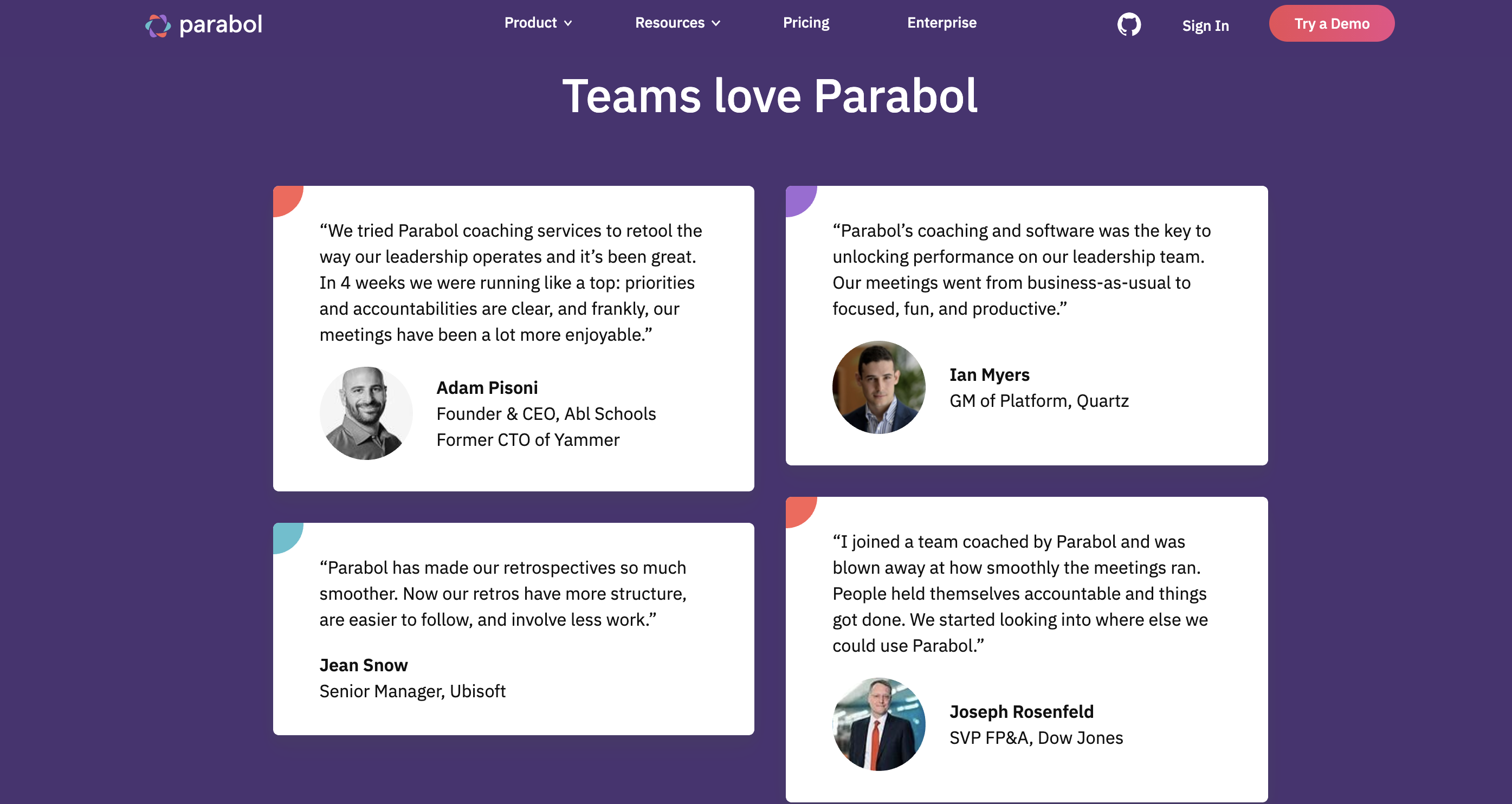
Case studies are a great way to use social proof if you're trying to show how your service or product has been implemented successfully by customers or clients.
A common tactic is asking satisfied clients for permission to talk about their experiences.
You can say something like, "We'd love the opportunity of sharing your success story with our audience."
If they agree, then you need to prepare preliminary questions that will dive deep into how you and the client/customer worked together successfully or how your product/service has solved a problem.
In fact, case studies are an effective method to prove that what you're offering is valuable and of good quality – especially if the customer is in the consideration stage of the buyer's journey and is comparing different solutions and providers.
There are several ways you can promote your case studies. Some companies have opted to feature their case studies on their blog, while others offer downloadable PDFs.
Example: Slack (B2B/B2C)
If we look at Slack, we see that the company features their case studies on a dedicated page called Customers. The page contains 50+ case studies that show how Slack is helping teams get organized and work smarter. The page is easily reachable through the main navigation menu.
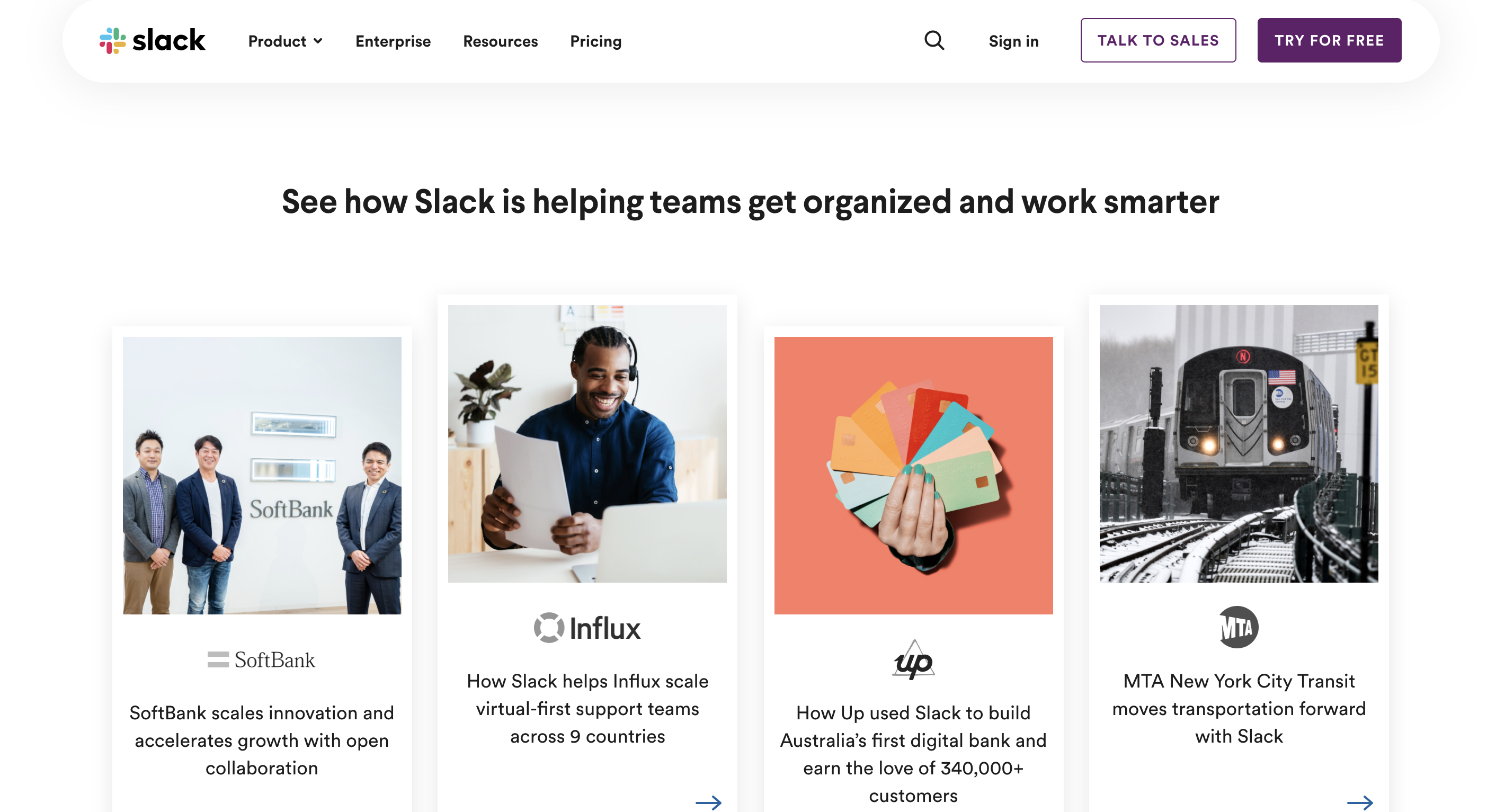
Have you ever noticed how every reputable company has logos from other popular brands featured on its home page?
What you're looking at is another way of incorporating social proof to drive sales.
By showing users your existing customer base, you're essentially telling them that these successful companies approve your product/service. And if it's good enough for them, it must be good for you, too!
With that being said, if you happen to work with some well-known brands, share that information publicly to get people interested in your product or service.
Example: Atlassian (B2B)
The photo below is an example from Atlassian's Customers page. The company has included the logos of some of their biggest clients, such as Pfizer, Nestle, and Samsung. If big brands like these trust Atlassian with their business, then there's no reason to be suspicious about the company.
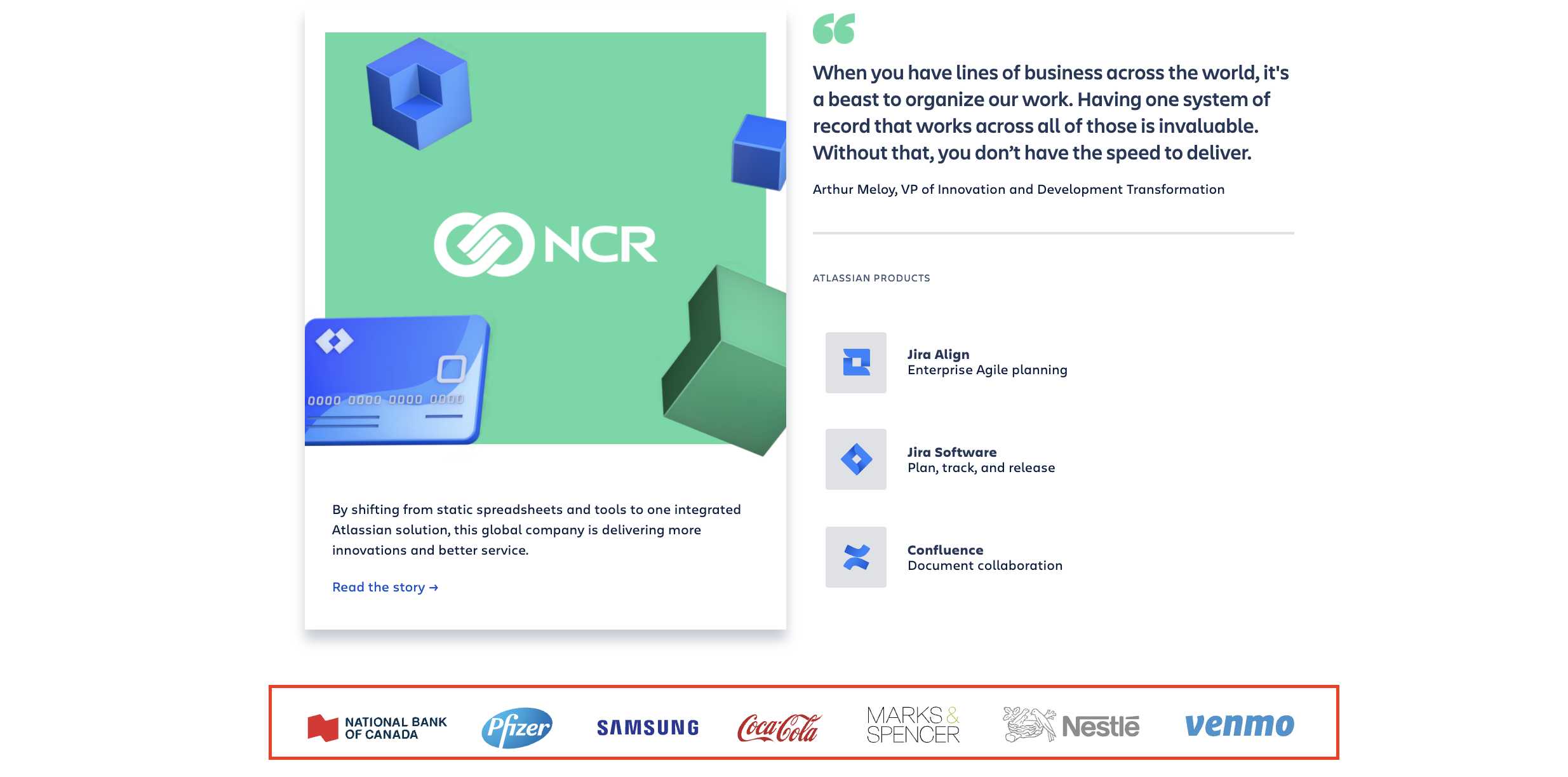
Has your company ever been mentioned in a social media post? Do your customers share their love in tweets and Linkedin posts? If yes, use this opportunity to increase your social proof. Many brands are using their customers' social media statuses as social proof by highlighting what their customers are saying about them. It's authentic, and at the same time, not too promotional or salesy.
Here's an idea: Why not assemble the best social media shout-outs and display these testimonials on your site?
Example: Notion (B2C/B2B)
In the example below, you can see how Notion, a tool that blends your everyday work apps into one, handles their social media shout-outs. A client mentioned the company in her tweet, saying how she's a big fan of the brand. Instead of just liking the tweet, Notion has also retweeted this so that it gets seen by a larger audience – without sounding too salesy. At the same time, they're building a relationship with their happy clients by showing appreciation for their kind words.

Just think about it:
What's the main role of brand ambassadors?
It's to help promote your referral program through word of mouth or across social media.
Brand ambassadors are an effective way to increase your social proof. They can humanize your service or product and make it more appealing to your potential customers. There are different types of brand ambassadors, including:
The best thing is that brand ambassadors don't have to be paid in cash. Sometimes they receive products from the brand they’re working with or gain premium access to their services. They can also earn commissions from the sales made by their promotion.
With that being said, if you're thinking about working with brand ambassadors, a great strategy would be to ask them to spread social proof on social media, their own websites, and within their circle of friends.
Example: Fitbit (B2C)
Have you ever wondered how did Fitbit grow into the successful company they are today? It's simple: They built strategic partnerships to help increase brand awareness. In 2015, they launched their 'FitForFood' campaign together with Feeding America, a charity that focuses on providing food to millions of people across the United States. The face of the campaign was the popular comedian Joel McHale that you probably know as the lead role on Community. Joel shared the promotional video with his 3+ million Twitter followers, mocking the lazy ways people claim to get fit.
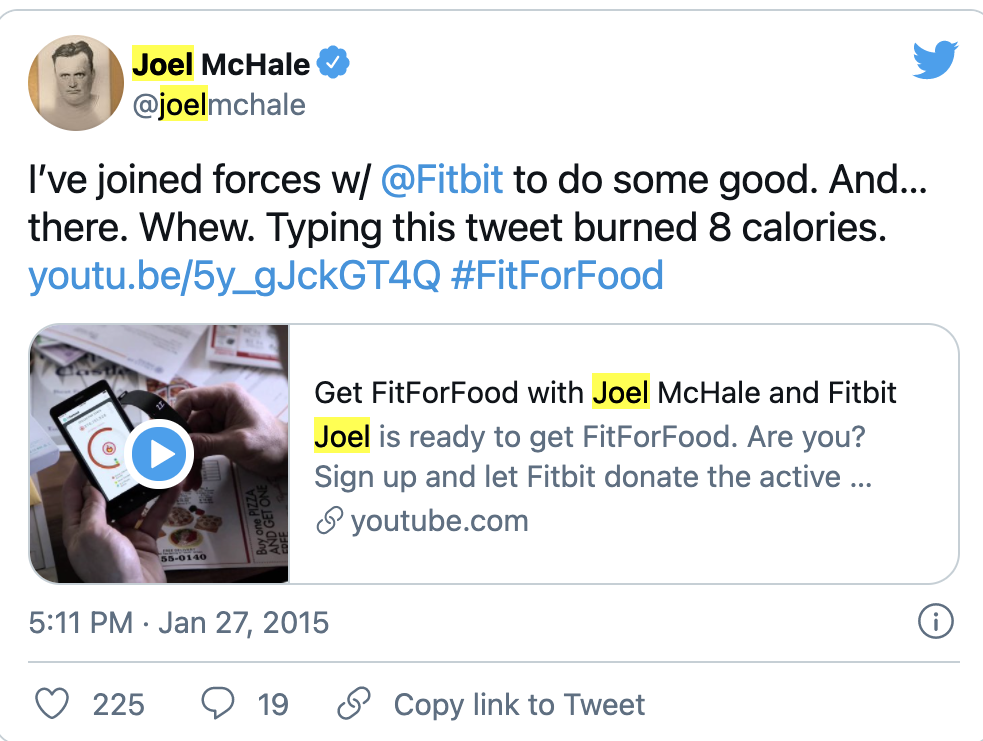
Have you ever landed on a website that proudly showcased its core metrics to the public?
Let's take a look at GrowSurf. GrowSurf is an open startup. If you visit this page, you can see how well GrowSurf is doing as a business at all times. The company's revenue and core metrics are transparently shared with the public. For instance, you can see the company's current progress towards its revenue goals, monthly traffic, conversion rate, total active customers, unique visitors, and more.
This is another example of social proof.
The good news is that you can use any relevant statistic to show customers how well you're doing.
For instance, you can display the number of:
This shows that you have an established business that is trusted by thousands of people. What's more, new visitors will likely have a positive first impression of your brand – you're transparent and have nothing to hide.
In addition to displaying these stats on your website, consider including the numbers in your social media bios.
Example: Hubspot (B2B)
We can see this in action on HubSpot's home page, displaying they have 7M monthly visits, 2.6 million social followers, 113,000 customers in over 120 countries, and other important stats that might interest their customers. With impressive stats like these, you can't help but be curious to learn more about their popular products.
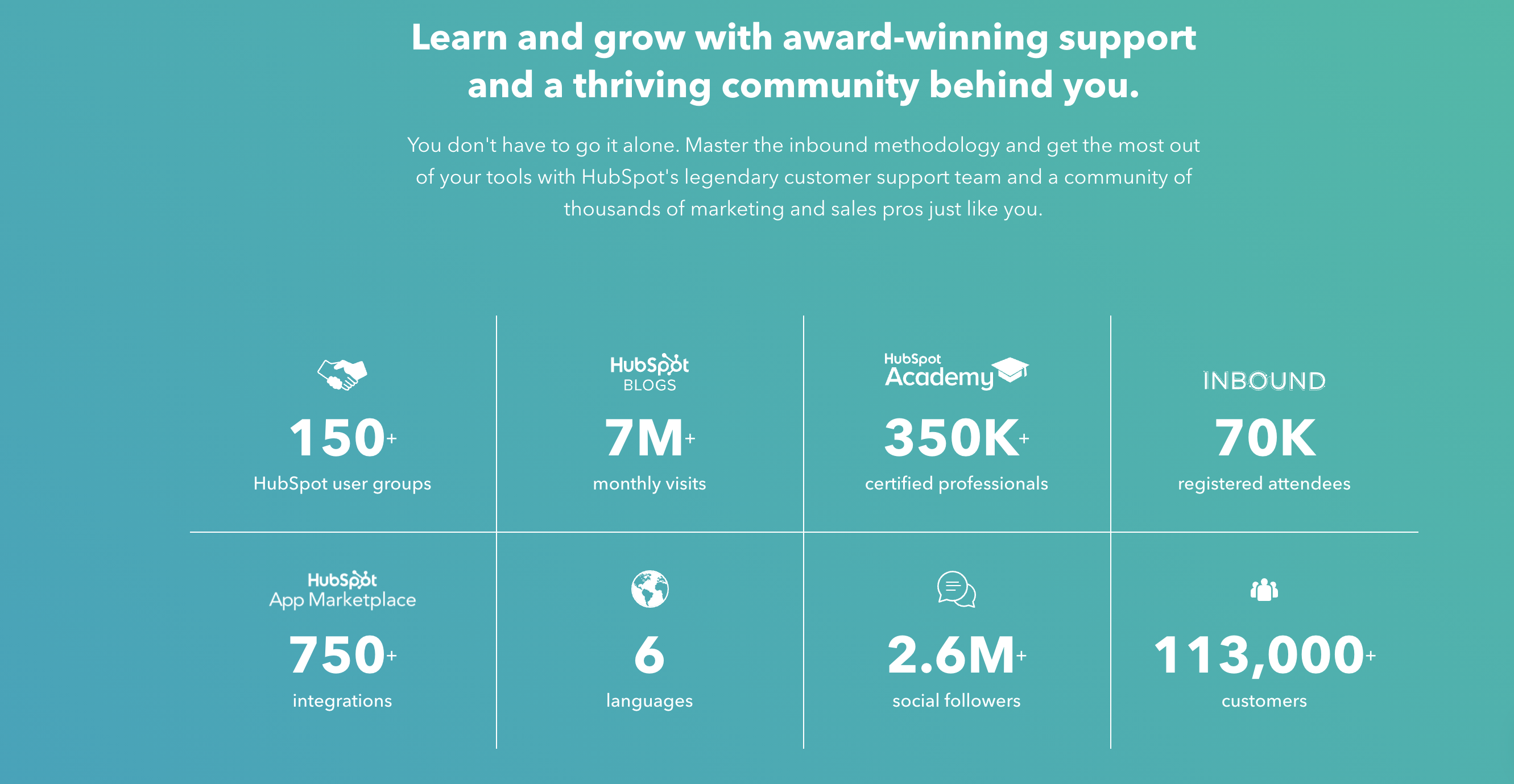
Has your brand ever been mentioned by a well-known news website?
Maybe it got mentioned in Forbes. Perhaps TechCrunch wrote a detailed review and praised your product/service.
If yes, then consider taking excerpts from these mentions and paste them on your website, so they're visible to your visitors.
This tactic is a great way to establish authority and increase trustworthiness among your audience.
Sometimes, you might even get mentioned on social media by an influencer, a big brand, the press, or an industry expert. Consider showing appreciation for these mentions by sharing their post or by saying something like "Grateful for the mention,” or “Honored to be featured.”
Example: Todoist (B2C)
Here's what Todoist does on their home page. If you scroll at the bottom of their home page, you'll see how they featured their five-star rating on Google Play and the App Store, as well as shared an excerpt from a review about their product by The Verge.
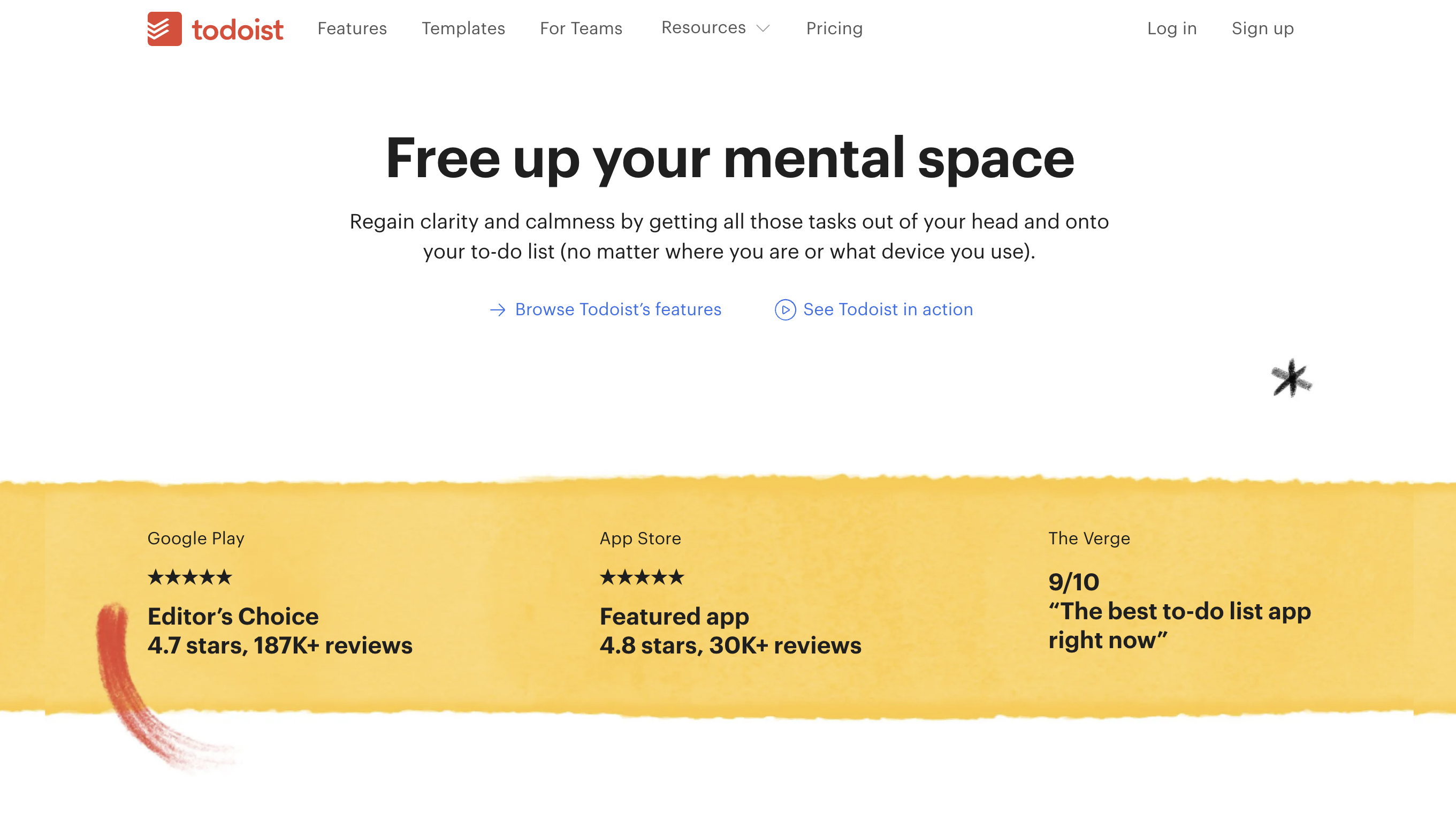
Here's a fact:
The average employee uses at least eight apps. The average person uses nine mobile apps per day and 30 apps per month.
From video conference apps and file sharing software to communication platforms and time management systems, people juggle between multiple apps on any given day.
If your product or service helps create a better work environment, let them know.
Usually, this better work environment comes in the form of integrations.
In fact, integrations are crucial for B2B SaaS companies. These companies can't expect to be successful without offering key integrations to other ecosystem players.
One way of promoting your integrations is by adding the logos of your integration partners on some pages of your website. Some businesses have an entire page dedicated to the integrations with other services they offer. Also, don't forget to promote your integrations across your social media platforms to make sure the good word reaches a broader audience.
Example: Hopin (B2B)
The example below shows how Hopin, a live online events platform, promotes its integrations. They have an entire page dedicated to their integrations where they list every third-party service their platform integrates with. When someone lands on this page, they may not know who Hopin is, but they've probably heard of Hubspot, Twitter, and Miro. This increases the credibility of Hopin and may lead to more conversions.
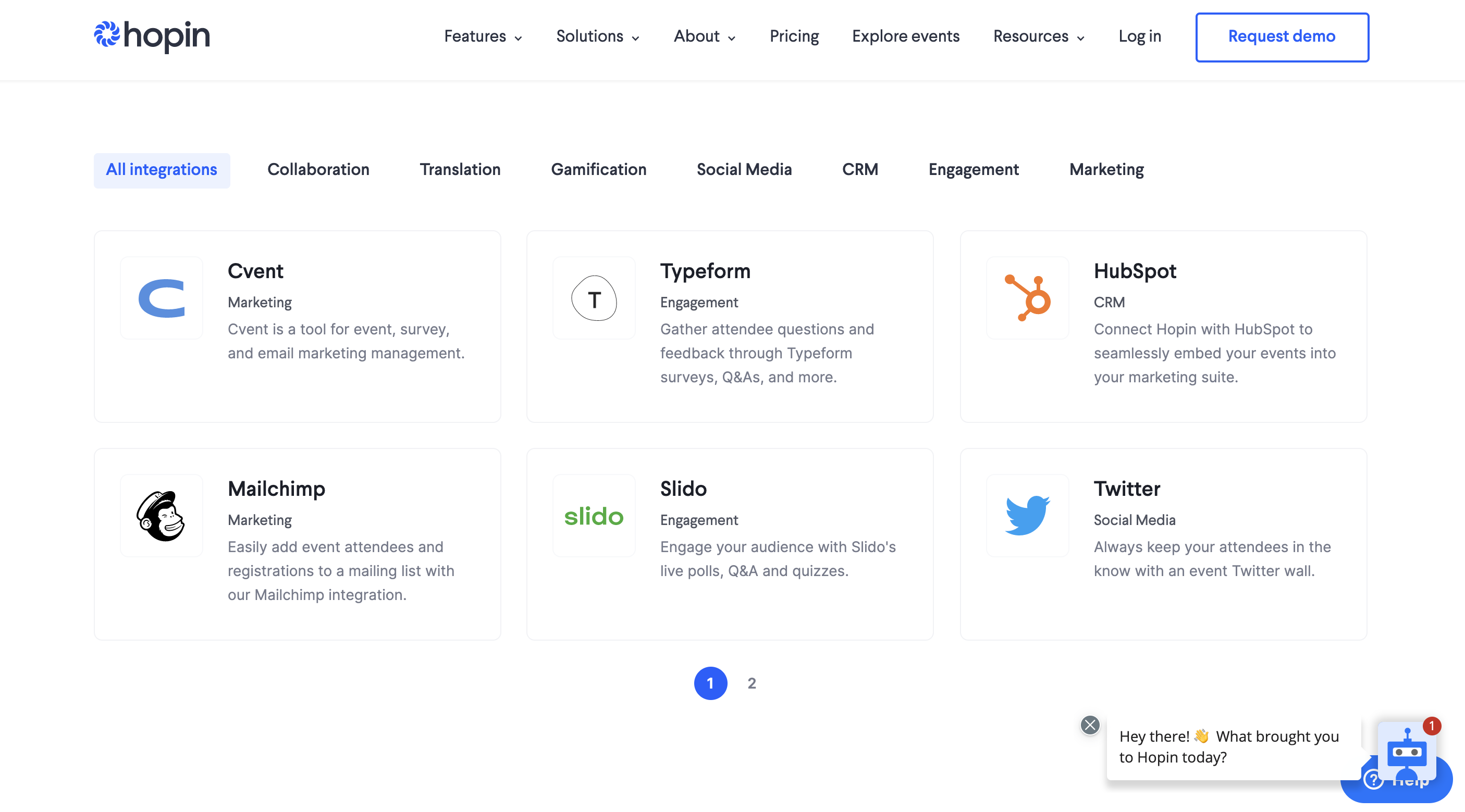
Has your product or service ever won an award or been recognized as a leader in your industry? If yes, show them off! Display these awards/recognitions on your website so that visitors can see your latest achievements.
This can be a fantastic opportunity to win new customers who are considering and evaluating the product/service you offer. Like reviews that can motivate customers to make a purchase, awards and recognitions can ensure that your business will meet their expectations.
Example: MailChimp (B2B)
Take a look at how MailChimp has displayed these types of awards and accolades on its homepage. If you scroll down on the home page, you'll get to this part where the company boasts about having been named one of the best global software companies of 2021 by G2. Considering G2 is one of the biggest review sites today that aggregates user reviews for business software, featuring this on the site confirms MailChimp's excellence.
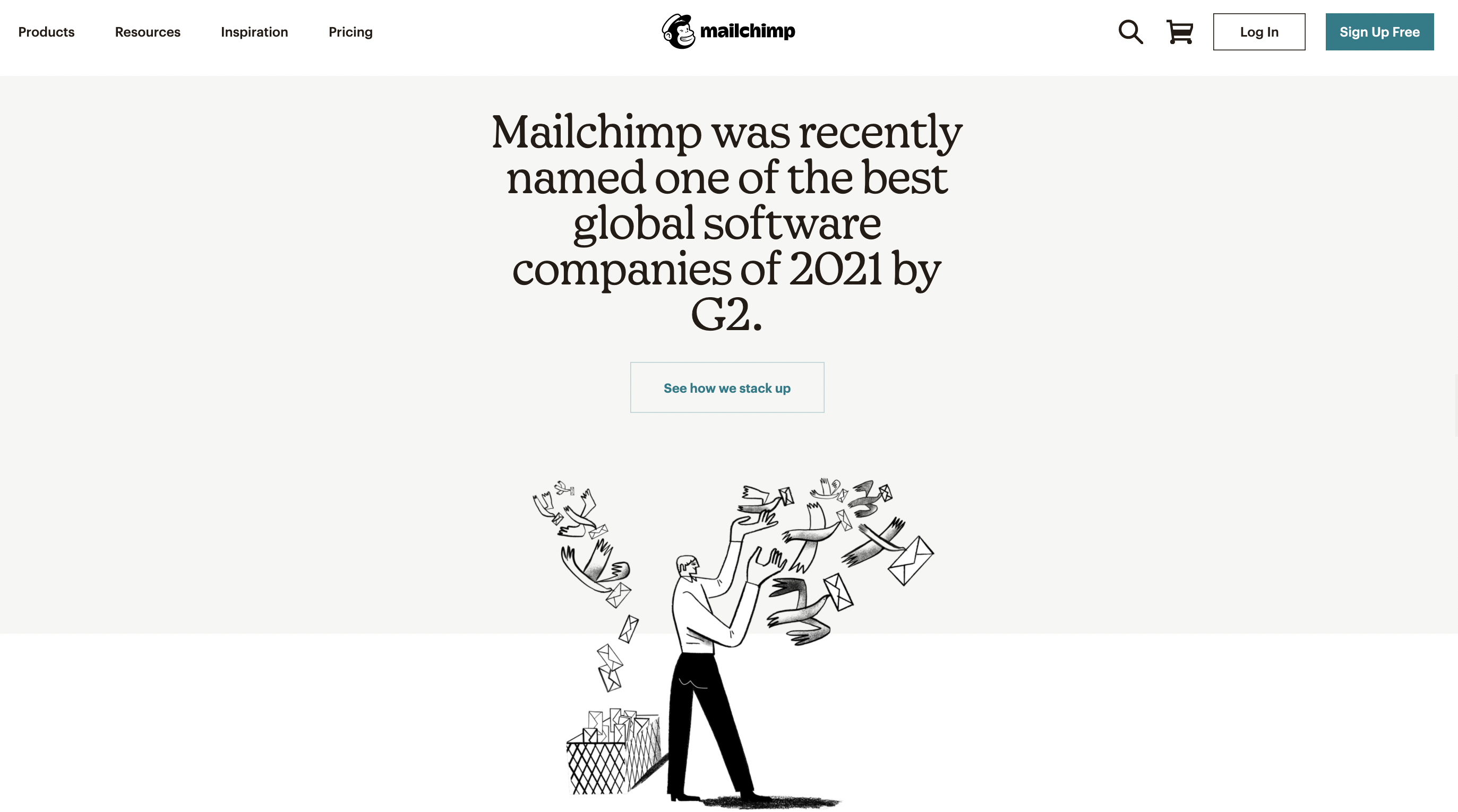
Inviting expert guests to contribute to your (virtual) events, podcasts, or blogs is a great way to use social proof.
For instance, you can organize a fireside chat – an informal conversation between a moderator and their guest – where you'll discuss a topic that's of great interest to your audience. Alternatively, you can invite an expert to join your podcast. By doing so, you'll create valuable content for your listeners and establish yourself as an authority in the industry.
Example: Airtable (B2B)
We can see this in action on Airtable's LinkedIn profile. The company is promoting a virtual event that will take place on June 16. The event's featured guest will be John Edgar, the Head of Growth Engineering at Pinterest. Considering Pinterest is the 14th largest social network in the world, hosting an event with a prominent figure from the company will help Airtable tap into the expert’s positive influence.
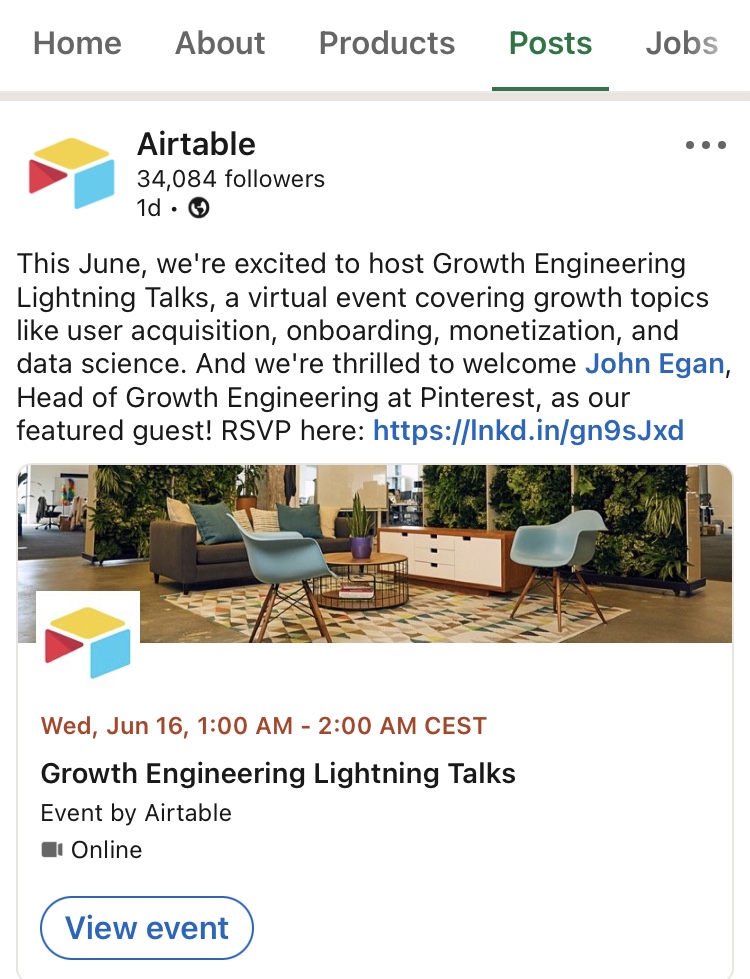
There are many different types of social proof. The best ones for you depend on your business and your industry.
I hope these ten ideas will teach you how to use social proof in your marketing and get your business more conversions.
To sum up, the top 10 ways how to use social proof to increase conversions are:
Case studiesto show how your service or product has been implemented successfully by customers or clients.
Brand ambassadorsto humanize your service or product and make it more appealing to your potential customers.
Integrationsto let your clients/customers know your product/service integrates with other ecosystem players.
Don't forget to include social proof on your key landing pages and on your social media. You can even experiment with adding social proof in your CTAs, for example, "Sign up today and join a community of 100,000+ users."
Good luck!
Read more about the 7 Principles of Persuasion:

Sign up for a free trial of GrowSurf to lower your customer acquisition costs, increase customer loyalty, and save gobs of time.
Launch Your Program
GrowSurf is modern referral program software that helps product and marketing teams launch an in-product customer referral program in days, not weeks. Start your free trial today.
Word of mouth marketing can be the strategy that skyrockets your business and takes it to another level. Here we tell you all you need to know about it.
While referral programs are an effective way to promote your products and services, they’re not always easy to optimize. Here are 4 powerful ways to optimize your referral program.
In this article we cover seven tried-and-true ways to use psychology in your newsletter referral program to get more subscribers.